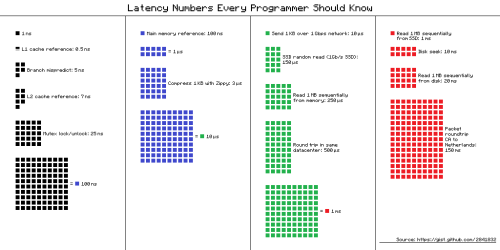I’m saving this here for current and future generations of programmers:
Latency Comparison Numbers -------------------------- L1 cache reference 0.5 ns Branch mispredict 5 ns L2 cache reference 7 ns 14x L1 cache Mutex lock/unlock 25 ns Main memory reference 100 ns 20x L2 cache, 200x L1 cache Compress 1K bytes with Zippy 3,000 ns Send 1K bytes over 1 Gbps network 10,000 ns 0.01 ms Read 4K randomly from SSD* 150,000 ns 0.15 ms Read 1 MB sequentially from memory 250,000 ns 0.25 ms Round trip within same datacenter 500,000 ns 0.5 ms Read 1 MB sequentially from SSD* 1,000,000 ns 1 ms 4X memory Disk seek 10,000,000 ns 10 ms 20x datacenter roundtrip Read 1 MB sequentially from disk 20,000,000 ns 20 ms 80x memory, 20X SSD Send packet CA->Netherlands->CA 150,000,000 ns 150 ms Notes ----- 1 ns = 10-9 seconds 1 ms = 10-3 seconds * Assuming ~1GB/sec SSD Credit ------ By Jeff Dean: http://research.google.com/people/jeff/ Originally by Peter Norvig: http://norvig.com/21-days.html#answers Contributions ------------- Some updates from: https://gist.github.com/2843375 Great 'humanized' comparison version: https://gist.github.com/2843375 Visual comparison chart: http://i.imgur.com/k0t1e.png Nice animated presentation of the data: http://prezi.com/pdkvgys-r0y6/latency-numbers-for-programmers-web-development/
This is a copy-paste of this gist, referenced from this blog post. Read and share both, for the better world.
